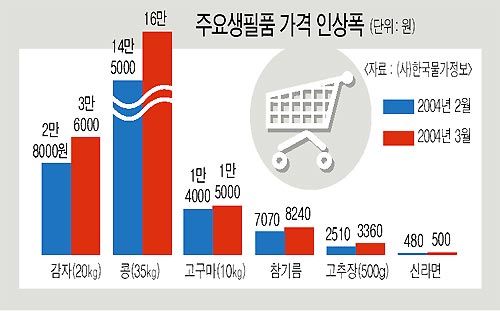(Social categories) "Ordinary people" or sômin on everybody's mind
Nancy Abelmann, an anthropologist working on Korea in the U. of Illinois glossed sômin mostly as "humble people" in her new book. That's ok, but only partly, when Koreans use the word on themselves, as a self-designation, but when it's used to criticize the government policies (like in today's Chosun Ilbo editorial), "humble people" doesn't work any more. A more inclusive term is needed. "Ordinary people" sounds lame, but can't find any better for this context. Chosun continues the use of the concept in an article about rising prices, which was placed right under the link to the editorial on the main homepage. (Well, when my other Korean kohyang Sillim-dong is mentioned in the first sentence of an article, I cannot but get sympathetic.)12일 낮 서울 관악구 신림동 신신림시장. 어른 2명이 가까스로 지날 수 있는 좁은 통로 양쪽으로 건어물, 그릇, 순대, 떡, 반찬 등을 파는 재래상점과 좌판들이 800여m에 걸쳐 즐비하게 늘어서 있지만 실제 물건을 사고파는 모습은 그리 눈에 띄지 않는다.  Picture linked from Chosun. The price of potato, 1800W/kg, is about twice of what it's here in Finland. 경기불황으로 가뜩이나 살림이 어려워진 서민들로서는 물가까지 올라 거의 등허리가 휠 지경이다. 서울 동작구 상도동에 사는 김모(여·43)씨는 “이전에는 월급 받으면 한달에 한꺼번에 쌀과 조미료를 사도 15만원정도 들었는데 요새는 20만원도 부족하다”며 “동네 마트에서 라면값은 연초에 비해 100원 이상 올랐고, 애들 과자값도 3개를 묶어 990원에 팔던 것이 한봉에 400원으로 올랐다”고 말했다.In the first quote, a very "ordinary people"-like site is introduced, a marketplace, and that in Sillim-dong, which is not known as a wealthy area. In the second quote, "ordinary people" are quoted, those who are getting in trouble because of the rising prices. Categories at del.icio.us/hunjang: seomin ∙ socialcategories ∙ money |


